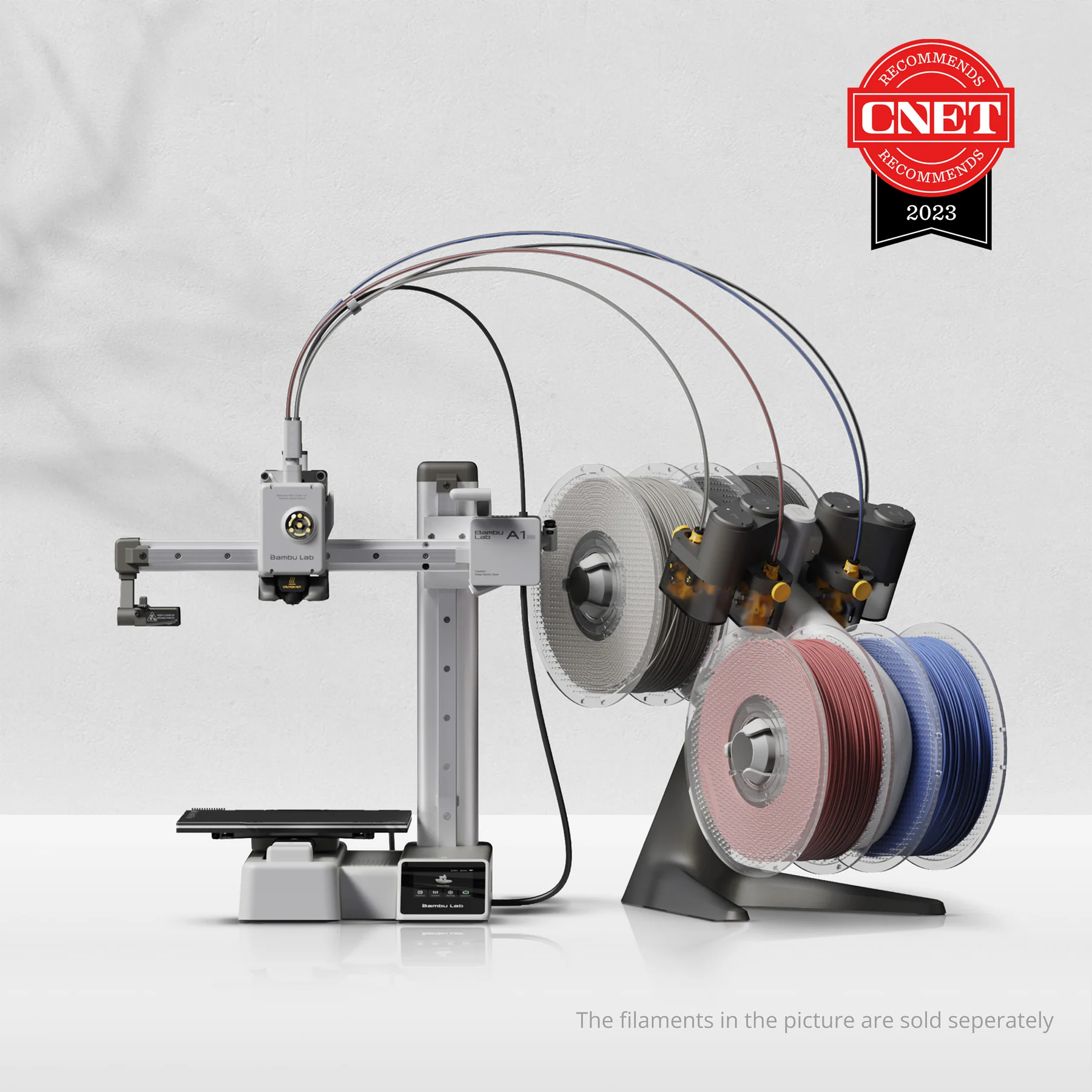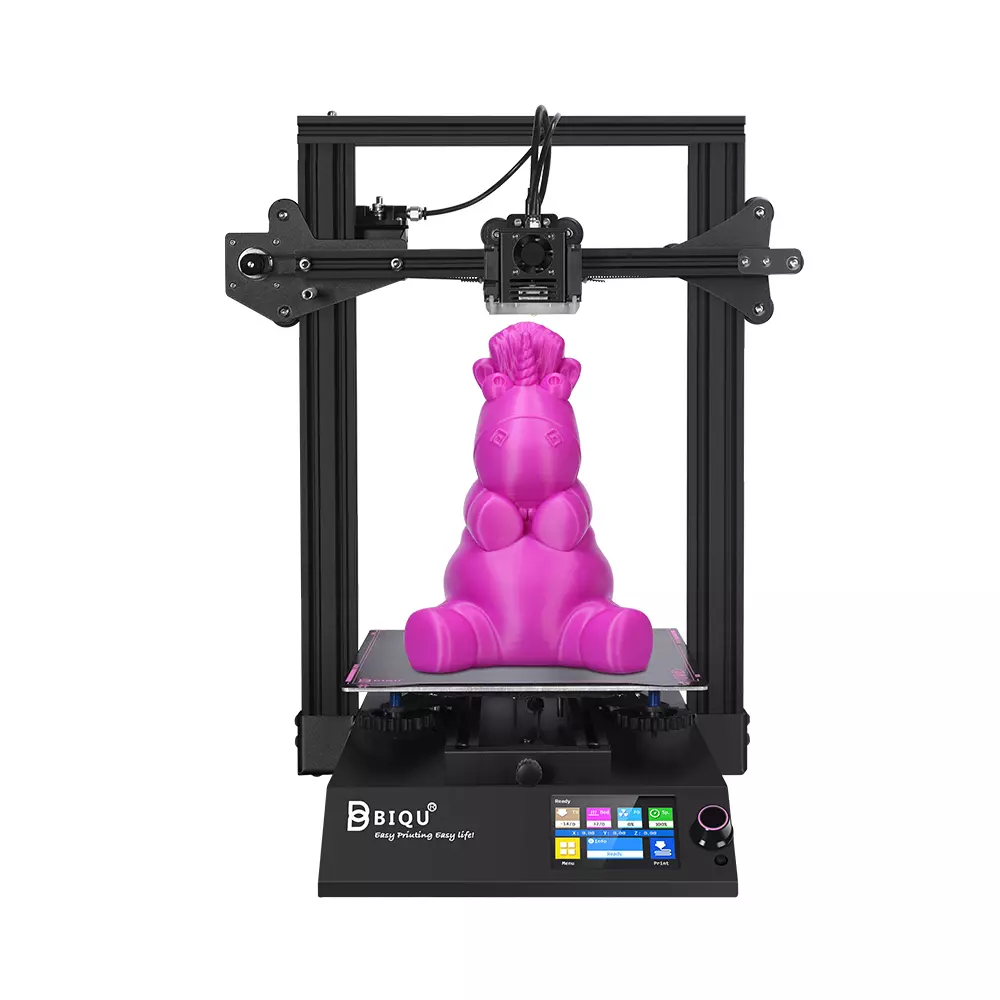Compare A1 Mini vs BIQU B1
Comparison between the best 3D printers
Choose the best 3D printer at the best price. The cheapest 3D printers are here.
Buy a 3D printer here with 3D Fila.
 |
 |
|
| Model | A1 Mini |
BIQU B1 |
| Printing Material | Filament | Filament |
| Buy Filament for Bambu Lab A1 Mini | Buy Filament forBigTreeTech BIQU B1 | |
| Estimated price | $549,00 | $269,00 |
| Manufacturer | Bambu Lab | BigTreeTech |
| Release Year | 2023 | 2020 |
| Print Volume [mm] | 180x180x180 | 235x235x270 |
| Printer Size [mm] | 315x347x365 | 412x402x492 |
| Weight [kg] | 5,5 | 8,00 |
| Power Loss Recovery | YES | YES |
| Enclosed printer | NO | NO |
| Bed Leveling | Automatic | Manual |
| Filament End Sensor | YES | YES |
| Bed type | Heated | Heated |
| Power supply system | Direct Drive | Bowden |
| Standard nozzle | 0,4 | 0,4 |
| Maximum Nozzle Temperature [°C] | 300 | 250 |
| Maximum Bed Temperature [°C] | 80 | 100 |
| Maximum printing speed [mm/s] | 500 | 100 |
| Filament holder | YES | YES |
| Camera for supervision | YES | YES |
| Recommended filaments | PLA, PETG, TPU, PVA | PLA, TPU, ABS, PETG |
| Recommended slicers | Bambu Studio, Super Slicer, Cura, Prusa Slicer, Orca | Cura, Simplify, Slic3r |
| Maximum Resolution [mm] | 0,1 | 0,1 |
| Processor | 32-bit Silenciosa | 32 Bits BTT SKR V 1.4 |
| Display | Touchscreen 2,4'' | Touchscreen TFT 3,5'' |
| Power Supply | 150 W | 24V / 360W |
| Connectivity | Wifi, Bambu bus, Cartão SD | SD / USB |
| Operating systems | Windows, Linux, Macbook | Windows, Mac, Linux |
| Date of registration in the system | 2024-04-10 | 2021-04-14 |
| Release date | 2023 | 2020 |
| Extra features | The Bambu Lab A1 Mini stands out not only for its impressive speed and automatic calibration, but also for its multi-color printing capability thanks to AMS Lite. This innovative system makes multi-color printing easy, making it accessible to everyone. AMS Lite, specific to the A1 Mini, supports up to four different materials simultaneously, providing creative freedom without complications. With comprehensive sensors for energy monitoring and recovery, a camera for timelapses and Wi-Fi control, the A1 Mini and AMS Lite together offer an intuitive and advanced 3D printing experience, ideal for materials such as PLA, PETG and TPU, and designed for simplicity and fast maintenance with quick-change nozzles. | The BIQU B1 is an advanced 3D printer with a silent 32-bit BTT SKR V1.4 motherboard and ARM Cortex-M3 CPU, offering DIY interfaces (I2C, SPI, WiFi) and dual Z-axis. Its dual BTT B1 TFT35 V3.0 operating system allows real-time monitoring and multiple printing modes, including G-code visualization effects. It stands out for its BIQU SSS (Super Spring Steel), ensuring easy model adhesion and simplified removal, with the possibility of using it on both sides. It includes a filament sensor, automatically pausing printing in case of filament breakage. The multicolored RGB lights integrated into the hotend allow you to view the printing status even at night. Additional notes include the need for a BIQU-specific Type-C cable and extra interfaces for smart filament sensor and BL Touch. |
| Support for multiple colors and materials (AMS and CFS) | YES | NO |
Notes * |
||
| Cost-benefit | 7 / 10 | 7 / 10 |
| Hardware | 4.2 / 10 | 2 / 10 |
| Tela | . | . |
| Print volume | 3 / 10 | 3 / 10 |
| Performance | 4 / 10 | 1 / 10 |
Conclusion |
| In conclusion, the comparison between the Bambu Lab A1 Mini and the BIQU B1 highlights key differences in features, performance, and overall value for money. The A1 Mini, while at a higher price point, offers advanced capabilities such as impressive printing speed, automatic bed leveling, and state-of-the-art multi-color printing with its AMS Lite system. It is designed for users seeking a more intuitive and high-performance 3D printing experience, particularly for materials like PLA, PETG, and TPU. On the other hand, the BIQU B1, while more budget-friendly, provides solid fundamental features including a larger print volume and a dual Z-axis for stability. However, it lacks some advanced functionalities that would appeal to users looking for high-end performance and ease of use. The manual bed leveling and limited maximum printing speed may deter those who prioritize convenience and speed. Ultimately, the choice between these two printers should be made based on specific user needs: if advanced features and speed are priorities, the A1 Mini is the preferable option; for those seeking a reliable, cost-effective solution with good basic functionality, the BIQU B1 remains an excellent choice. As such, both printers cater to different segments of the market, allowing users to select based on budget and desired features. |

